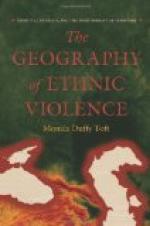|
This section contains 3,766 words (approx. 13 pages at 300 words per page) |

|
"A DEFINING CHARACTERISTIC of the post–Cold War era has been the disjuncture between its complex, horrifying events—anarchy in Somalia, civil war in the former Yugoslavia, genocide in Rwanda—and the presumption among some foreign policy elites that easy solutions to such disasters can be found," says Stephen John Stedman, professor of comparative politics at Johns Hopkins School of International Studies. Establishing policy on preventing ethnic conflicts is a central challenge for post–cold war strategists. According to Leslie Gelb, president of the Council on Foreign Relations, "The main strategic challenge for the United States is to develop plans . . . to stem civil wars." The principles to guide these new policies are derived by analyzing the successes and failures of the past to determine what methods will be most effective in handling future crises.
Some analysts believe ethnic...
|
This section contains 3,766 words (approx. 13 pages at 300 words per page) |

|




